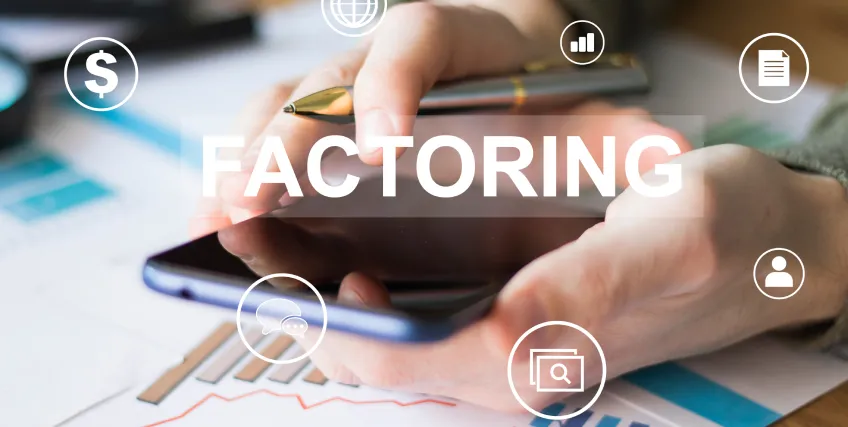Pros and Cons of Invoice Financing for Small Businesses
Jul 3, 2025 | Last Updated on: Jul 7, 2025

Cash flow issues can make or break a small business. Even profitable companies often run on small margins, sometimes struggling to meet payroll, pay vendors, or invest in their own growth simply because of outstanding invoices that haven’t been paid. In this type of situation, business invoice financing can be a much-needed lifeline, offering quick access to working capital without forcing the business to take on long-term debt while they wait for outstanding customer payments.
Like any business credit tool, though, business invoice financing comes with some trade-offs. Here’s a look at both the benefits and potential drawbacks of invoice financing loans, how it works, and what to ask when deciding whether this form of business financing is a good fit for your small business.
What Is Business Invoice Financing?
Business invoice financing, sometimes called accounts receivable financing, allows companies to borrow against unpaid customer invoices.
Unlike traditional loans, invoice financing is tied to your receivables, making it particularly useful when you have large, unpaid invoices but need capital now. Rather than waiting for days or months for an expected payment to arrive, business owners can access most of the invoice amount upfront from a lender, then repay the borrowed amount as agreed.
Though similar, it’s important to note that invoice financing is not the same as invoice factoring.
- Invoice financing: With invoice financing, the business retains control of customer accounts receivable, so you are still responsible for collecting payment. The lender simply gives you a cash advance based on your invoice values, but you will repay that business loan once your customers send payment.
- Invoice factoring: With invoice factoring, you are essentially selling the debt to a lender at a discounted rate. The financing company takes over the collection process and may communicate directly with your clients, who will pay their remaining balance directly to the lender.
Both options can be used to smooth out cash flow gaps, especially if your business offers net payment terms.
Pros and Cons of Business Invoice Financing
There are some notable benefits and downsides to using invoice financing as a financing solution for your small business. While this can be a great funding option for small business owners in a pinch, it may also be costly and can even create future issues if you aren’t careful.
Pros of business invoice financing
Fast access to cash
One of the biggest advantages of invoice financing is how quickly you can get cash. In many cases, invoice financing companies can approve and fund small business financing quickly. This makes it a much faster option than traditional bank loans or small business loans through the Small Business Administration (SBA).
A quick application process and fast funding can help your small business meet payroll, pay suppliers, take advantage of a growth opportunity, or even handle unexpeced emergencies or seasonal slowdowns.
Easier approval criteria
Unlike business bank loans, which rely heavily on eligibility criteria like your business credit score and financial history, business invoice loans place more weight on your customers’ creditworthiness. If you have a roster of reliable clients and can show evidence of a reliable payment history, you may qualify for business invoice financing even if your company has limited credit or is a startup with a short operating history.
Opportunities scale with your growing business revenue
The amount you can borrow with business invoice financing increases along with your invoices. If your sales volume grows, you can typically access more working capital without renegotiating terms or reapplying.
This makes invoice financing loans a flexible, growth-aligned option for businesses that are expanding quickly, but don’t have the cash reserves to keep things running while waiting on slow-paying customers.
You’ll keep ownership of your business
Some types of business financing give away some of the control or ownership of your company in exchange for cash. These options include venture capital or equity financing.
Business invoice financing, on the other hand, doesn’t require you to give up any ownership or control of your company, even if you find yourself needing cash quickly. You’ll maintain full decision-making power, avoid long-term debt burdens, and stay independent.
It’s a short-term commitment
Most invoice financing arrangements are short-term, meaning you’re not locked into a multi-year agreement like with a big business loan. You can use invoice financing as needed — like during seasonal slumps or to bridge occasional gaps — with repayment terms that often match your customers’ repayment terms. So if your clients have 90 business days to pay, you may have 90 days to pay back the invoice financing lender.
Cons of business invoice financing
Higher cost than traditional loans
When it comes to business lending, you’ll need to pick two: Quick, easy, or cheap. Business invoice financing is both quick and easy, but it may also cost you more than other financing options.
Business invoice financing costs can range depending on factors like the creditworthiness of your clients, the industry you’re in, and how long it takes the invoice to get paid. While that interest rate might not seem like much, those fees can add up quickly, especially if your margins are thin.
It may affect customer relationships
With invoice factoring, your financing company could contact your customers directly, either to confirm the invoice or arrange payment. This could cause your clients to be confused or even concerned about the financial health of your business.
Some lenders offer "confidential" factoring or traditional invoice financing loans that keep you in control of collecting the balance due, so your customers stay none the wiser. Be sure to ask the lender how invoice financing works through them and whether you can stay in charge of collecting funds.
It’s not suitable for all businesses
This type of financing isn’t right for every small business. Invoice financing only works if you issue invoices to customers and have receivables from creditworthy clients.
If you sell directly to consumers or operate on cash terms, business invoice financing isn’t an option. You’d need to consider another type of loan for your business, like a business line of credit, merchant cash advance, or even a business credit card to cover unexpected expenses.
There’s a risk of hidden fees
Not all financing companies are totally transparent about their fees. Beyond the basic borrowing rate, you might find yourself facing application or origination fees, early repayment penalties, or minimum usage requirements. Some business invoice financing companies keep your account open just like a revolving credit line, so you can borrow as needed... but you may also face surprise monthly service fees for this.
Be sure to read the fine print and ask for a full breakdown of costs before signing on any dotted lines.
It’s a temporary solution for ongoing problems
If your business is often strapped for cash — either due to poor financial management, pricing issues, slow customer growth, or customer payment delays — business invoice financing may offer short-term relief but won’t solve the underlying issue. In fact, you could find yourself just kicking the proverbial can down the road, borrowing from tomorrow’s dollars to pay today’s bills.
Business invoices financing is best used as an occasional bridge but shouldn’t be a crutch for your business.
Who Should Consider Small Business Invoice Financing?
Small business invoice financing can be a wise financing option for certain types of companies facing budget gaps. It may be particularly useful for:
- Businesses with long payment terms
- Companies experiencing rapid growth and quickly rising expenses
- Seasonal businesses with predictable (but temporary) slow periods
- Businesses with strong receivables but tight cash flow
Some common industries that turn to business invoice financing include manufacturing and wholesale, staffing and recruitment, logistics, transportation, and creative and marketing agencies. For these types of companies, invoice financing might offer the speed and flexibility needed without the red tape credit history requirements, and application delays of a traditional business loan.
How to Choose the Right Business Invoice Financing Lender
Not all lenders offer the same terms, transparency, or service. Choosing the right one will not only give you access to the cash you need but also ensures that you don’t overpay to borrow.
When comparing providers, you might want to ask the following questions:
- What are the eligibility requirements and what will I need to provide with my application (business and personal credit checks, financial statements, bank account statements, etc.)?
- What is the total cost for borrowing, including invoice financing or invoice factoring fees, application fees, and any other hidden expenses?
- Is the debt recourse (which means you’re responsible if the client doesn’t pay) or non-recourse?
- Will the lender contact my clients?
- Who is responsible for collecting the invoice now?
- Are there minimum invoice amounts or volume requirements to borrow?
- How long is the approval and funding process?
Look for a financing partner that understands your industry, offers clear terms, and supports your long-term growth, not just offers a quick fix.
Final Thoughts
Business invoice financing is a powerful tool for solving short-term cash flow problems, especially for growing companies with reliable receivables. It offers quick access to capital without sacrificing ownership, making it attractive for businesses that don’t qualify (or can’t wait) for traditional loans.
Business invoice financing definitely isn’t without risks. High costs, potential client concerns, and limited applicability mean it’s not right for every company. Before applying for an invoice financing loan, weigh the pros and cons carefully, making sure that you understand your cash flow patterns, evaluate other funding options, and read the terms closely before finalizing your decision.
FAQs on Business Invoice Financing
What’s the most (or least) I can borrow with business invoice financing?
The amount you can borrow depends on the value of your business’s unpaid invoices. Many lenders have minimum invoice amounts (often $500 to $1,000 per invoice) and may finance up to 80% or 90% of the invoice’s value. There may also be maximum caps, depending on the individual lender and your business profile.
Can startups use invoice financing, or do I need to be in business for a certain amount of time?
Startups can often qualify for business invoice financing, especially if they have a roster of creditworthy clients. While some lenders prefer to lend to companies with at least six to 12 months of business history, many invoice financing lenders prioritize the strength of your receivables over your company’s age.
What’s the difference between a recourse and non-recourse agreement in business invoice financing?
In a recourse agreement, your business is responsible for the balance if your client doesn’t pay up in the end. If the invoice goes unpaid, the lender can require repayment from you directly, even though you technically “sold” the debt. In a non-recourse agreement, the lender agrees to absorb any loss, but these agreements are often more expensive and harder to qualify for.
What kind of hidden fees should I look out for in a business invoice financing contract?
Read your documents carefully, looking for application fees, invoice processing fees, monthly service charges, early repayment penalties, and inactivity fees. Some lenders will charge minimum usage requirements or lock you into long-term agreements even if you don’t need the service regularly, which can cost you more than you expect.
Should I consider invoice factoring instead of invoice financing?
Invoice factoring may be a better fit if you don’t mind the lender contacting your clients or taking over invoice collections. This option is often faster and easier but could affect client relationships down the line. Invoice financing, on the other hand, is more discreet and gives you more control, though you will still be responsible for collecting payments and chasing down clients as needed.
Frequent searches leading to this page
Related Articles
What is Factoring? Definition and Benefits of Factoring for Small Businesses
September 5, 2025
Term Loans are made by Itria Ventures LLC or Cross River Bank, Member FDIC. This is not a deposit product. California residents: Itria Ventures LLC is licensed by the Department of Financial Protection and Innovation. Loans are made or arranged pursuant to California Financing Law License # 60DBO-35839




